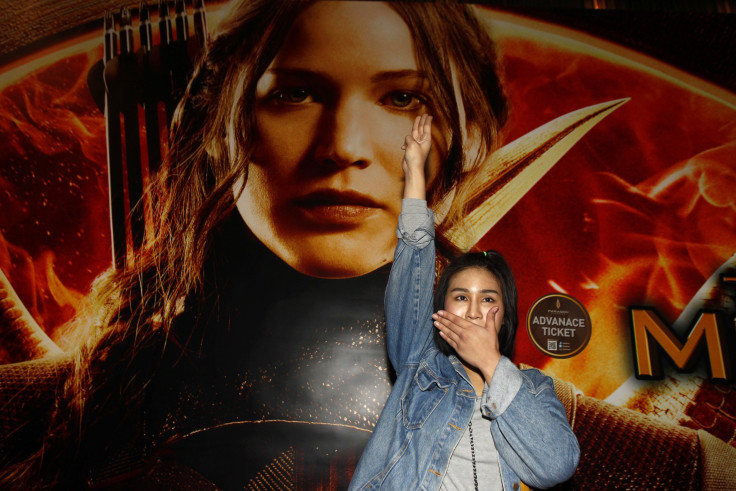The Hunger Games Mockingjay Release: 6 Times Revolution Inspired Pop Culture -- And The Other Way Around

The fictional revolution in the "Hunger Games" movies is having real consequences for protesters across the world. Five students were arrested Wednesday in Thailand for holding up the series' famous three-finger District 12 salute at a speech by the country's new prime minister, but that's not the first time Katniss-inspired actions have gotten activists in trouble.
In China, the latest "Hunger Games" installment was delayed amid rumors the government thought it too sensitive in light of the Hong Kong student rebellion. Last year in Oklahoma, environmentalists faced terrorism charges for using a mockingjay-emblazoned banner.
But in most cases, revolution causes pop culture, not the other way around, Ohio University contemporary history professor Kevin Mattson told the International Business Times. "What people do with culture is often they make use of it in their own way," he said.
Here are six times revolution inspired pop culture -- and vice versa:
"Uncle Tom's Cabin" and abolitionism
Harriet Beecher Stowe published "Uncle Tom's Cabin" in 1852, and 10 years later President Abraham Lincoln reportedly called her "the little woman who wrote the book that started" the Civil War. The novel's social impact was huge, according to the Harriet Beecher Stowe Center in Connecticut. The suffering black characters confronted readers with the harsh realities of American slavery, and people were inspired to join the abolitionist movement.
"La Camisa Negra" and Italian neo-fascism
Colombian rock star Juanes released "La Camisa Negra," which means "The Black Shirt," in 2005 as a love song. But Italians associated the ballad's title with the uniforms worn by Fascists under Benito Mussolini, Hoy reported. Critics called it propaganda, and protesters began raising their right arms in mock salutes whenever "La Camisa Negra" played in nightclubs.
Woodstock and Vietnam War protest
When performers like Joan Baez and Jefferson Airplane played the Woodstock Music and Art Fair in New York in 1969, they took strong stances on social justice and peace. Musicians at Woodstock were largely anti-war -- especially Jimi Hendrix, who played a sardonic version of "The Star-Spangled Banner," according to the Gilder Lehrman Institute of American History. The three days of peace and music not only united attendees but also bolstered the growing counterculture movement.
"V for Vendetta" masks and Anonymous
White Guy Fawkes masks from the "V for Vendetta" movie have become iconic disguises for the online hacker group Anonymous as it fights censorship, the Economist reported. In the Anonymous attacks on the Church of Scientology in 2008, participants wore the masks not only to connect themselves with Fawkes, a 17th-century English terrorist, but also to conceal their identities.
Rock music and the Serbian revolution
In 1990s Serbia, musicians called out President Slobodan Milošević's regime in their songs. Rock songs galvanized opposition to policies like the military draft and media blackouts, according to Music and Politics, and became the voice of the general public. "Our songs didn’t reduce the number of bombs, but we simply wanted to say to people what we thought about everything that was happening," artist Srdjan Gojkovic Gile said.
"Les Misérables" and the Hong Kong Umbrella Movement
Pro-democracy students camping in the streets of Hong Kong have borrowed their anthem from the famous musical, chanting "Do You Hear The People Sing?" in Cantonese. In "Les Misérables," 19th century French rebels sing the song as they ready to fight the government, CNN reported. Protesters in Hong Kong want to be heard as well: There, they perform "Do You Hear The People Sing?" en masse and ask listeners to wake up -- a lyric from the song's Cantonese translation.
© Copyright IBTimes 2025. All rights reserved.






















